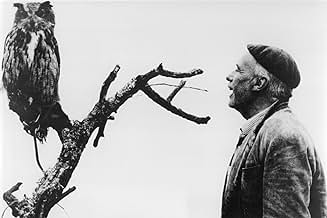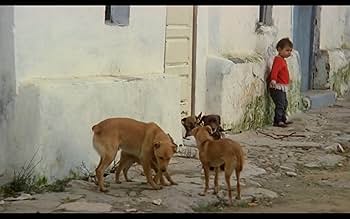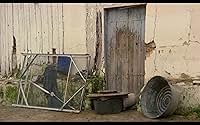Espagne, années 60. Des gens issus d'une famille très pauvre travaillent à la campagne, au service d'une riche famille de propriétaires terriens.Espagne, années 60. Des gens issus d'une famille très pauvre travaillent à la campagne, au service d'une riche famille de propriétaires terriens.Espagne, années 60. Des gens issus d'une famille très pauvre travaillent à la campagne, au service d'une riche famille de propriétaires terriens.
- Réalisation
- Scénario
- Casting principal
- Récompenses
- 6 victoires et 4 nominations au total
Pepín Salvador
- Obispo
- (as José Salvador)
Avis à la une
This intelligent drama based on a Miguel Delibes' novel and screenplay by Antonio Larreta is perfectly acted by a strong cast and masterfully directed . It depicts a brooding study about rich and poor society , making a shattering accusation against the powerful class who cares on selfish occupations more than help families in distress . Somewhere in the Extremadura region ( Spain ) , in the 60s where still rules medieval traditions , archaism and feudalism . Paco ( Alfredo Landa) and his wife Régula (Terele Pavez) along with their tree sons - one of them is backward - form a very unfortunate family . They work as tenant farmers for wealthy baron land ( Agustin Gonzalez , Agata Lys ) of a ¨Cortijo¨ . The older sons can not go to school because the ¨Señorito¨ needs their employment as servants . When Regula's brother ( Francisco Rabal) is fired by another landowner ( Jose Guardiola ) where he has worked for several years , then he settles down along with the family and the events get worse .
This over-the-top movie contains a relentless criticism to high class and the human exploitation and an attack against the rural life during the Francisco Franco time of the 60s . It's a thought-provoking drama about sacrifice, familiar love and feeling with interesting character studio of a varied assortment of individuals . It's a brilliant and touching film though sometimes is slow moving and tiring but is developed with intelligence and sensibility. In the picture are treated ethic and moral themes narrated with great sense of fairness and ductility .T his top-notch movie featuring a magnificent acting by whole casting . Awesome Alfredo Landa as the servile Paco and his wife a sensational Terele Pavez . Enticing and sensational roles with first rate performances as the cocky Señorito Ivan exceptionally acted by Juan Diego , the marchioness Mary Carrillo and her daughter played by Maribel Martin also producer along with the early deceased Julian Mateos . Of course Francisco Rabal who steals the show as Azaria always shouting : ¨ Bonita Milano¨ . Both players , Francisco Rabal and Alfredo Landa , deservedly won Ex-aequo prize the best actors in Cannes Film Festival and Prize of the Ecumenical Jury - Special Mention to filmmaker Mario Camus and the picture was Nominated Golden Palm .
Furthermore , ample shots on cloudy and nebulous skies and prairies plenty of trees filmed on location in Alburquerque, Zafra , Merida ,Badajoz, Extremadura, Spain with fine cinematography by Hans Burman . Atmospheric and evocative musical score by usual Anton Garcia Abril. This excellent motion picture is dedicated to makeup artist Julian Ruiz and stunningly directed by Mario Camus . Mario is an expert on interesting dramas as proved in ¨ The house of Bernard Alba¨ , ¨La Colmena¨ , ¨The days of the past ¨ and many others . Rating : Better than average , it's a riveting film though very depressing and downbeat . Essential and indispensable watching .
This over-the-top movie contains a relentless criticism to high class and the human exploitation and an attack against the rural life during the Francisco Franco time of the 60s . It's a thought-provoking drama about sacrifice, familiar love and feeling with interesting character studio of a varied assortment of individuals . It's a brilliant and touching film though sometimes is slow moving and tiring but is developed with intelligence and sensibility. In the picture are treated ethic and moral themes narrated with great sense of fairness and ductility .T his top-notch movie featuring a magnificent acting by whole casting . Awesome Alfredo Landa as the servile Paco and his wife a sensational Terele Pavez . Enticing and sensational roles with first rate performances as the cocky Señorito Ivan exceptionally acted by Juan Diego , the marchioness Mary Carrillo and her daughter played by Maribel Martin also producer along with the early deceased Julian Mateos . Of course Francisco Rabal who steals the show as Azaria always shouting : ¨ Bonita Milano¨ . Both players , Francisco Rabal and Alfredo Landa , deservedly won Ex-aequo prize the best actors in Cannes Film Festival and Prize of the Ecumenical Jury - Special Mention to filmmaker Mario Camus and the picture was Nominated Golden Palm .
Furthermore , ample shots on cloudy and nebulous skies and prairies plenty of trees filmed on location in Alburquerque, Zafra , Merida ,Badajoz, Extremadura, Spain with fine cinematography by Hans Burman . Atmospheric and evocative musical score by usual Anton Garcia Abril. This excellent motion picture is dedicated to makeup artist Julian Ruiz and stunningly directed by Mario Camus . Mario is an expert on interesting dramas as proved in ¨ The house of Bernard Alba¨ , ¨La Colmena¨ , ¨The days of the past ¨ and many others . Rating : Better than average , it's a riveting film though very depressing and downbeat . Essential and indispensable watching .
This is one of the best Spanish movies I have seen. For many reasons. First, the story, which is based on a great novel by the brilliant writer Miguel Delibes, can be seen from different points of view: as the characters in themselves, or as the history of the spanish society through two generations. Second, the actors do an incredible performance (Paco Rabal and Alfredo Landa are really fantastic, not to mention Juan Diego, Mary Carrillo, Terele Pávez...). Third, the scenes' directing and editing rise to the occasion. The result is a fresh, intelligent and charming film that we won't forget for a long time. Perhaps Belén Ballesteros and Juan Sachez's performances aren't worthy of the occasion, but that's the least of my worries.
In the opening scenes of this movie, I couldn't tell what century it was. The peasant family living in their hovel with no electricity or running water and their subservient attitude toward the master made me wonder if this movie was taking place in the 19th century. But no, a car appeared, a model from the 1960s, so I knew that it took place in relatively recent times.
Filmed in muted, grayish tones reminiscent of a Goya painting, this film gives one an idea of what life must have been like, not only for Spanish peasants in the Franco era but also for medieval serfs and slaves in the pre-Civil War South. The master and mistress treat their own whims as more important than the peasants' needs, require them to act and speak in a subservient manner, act as if small favors are huge concessions (The family gets to move into a house with electricity!), and literally treat the men of the family as if they were hunting dogs, forcing them to fetch the game that the master spends an inordinate amount of time shooting. In one case, a man is forced to fetch while trying to recover from a broken leg. When foreign visitors criticize the master and mistress for their treatment of the peasants, they make a big show of demonstrating that the peasants are happy and can write their own names (but only because they have just been taught).
But the world is changing, and even the meekest peasant may reach his limit...
Unfortunately, this film has never been released on DVD for Region 1, and the Region 2 version is out of print, so few people will be able to see this brutal but fascinating glimpse of the twilight of an era when Spanish society was composed of countless little dictatorships.
Filmed in muted, grayish tones reminiscent of a Goya painting, this film gives one an idea of what life must have been like, not only for Spanish peasants in the Franco era but also for medieval serfs and slaves in the pre-Civil War South. The master and mistress treat their own whims as more important than the peasants' needs, require them to act and speak in a subservient manner, act as if small favors are huge concessions (The family gets to move into a house with electricity!), and literally treat the men of the family as if they were hunting dogs, forcing them to fetch the game that the master spends an inordinate amount of time shooting. In one case, a man is forced to fetch while trying to recover from a broken leg. When foreign visitors criticize the master and mistress for their treatment of the peasants, they make a big show of demonstrating that the peasants are happy and can write their own names (but only because they have just been taught).
But the world is changing, and even the meekest peasant may reach his limit...
Unfortunately, this film has never been released on DVD for Region 1, and the Region 2 version is out of print, so few people will be able to see this brutal but fascinating glimpse of the twilight of an era when Spanish society was composed of countless little dictatorships.
10erwinoz
If I would believe in a god who created man as his equal, Mario Camus would be one of the first people to come in mind to make me understand how powerful that god must be. 'Los santos inocentes' is a masterpiece of European cinema. The movie brings us back to times in Spain where most people were nothing more than property of the few rich. The 'master' even had the right to be the one to make the daughters of his serfs lose their virginity. A man and wife living such a cruel life, with trouble enough of their own, still open up their house for the wife's brother Azarias (Francisco Rabal), when he -at old age- loses his job. And Rabal gives us a performance of simplicity and joy that we will never ever forget. Although I've heard of people who found it difficult to see the beauty through all the misery, to me this is one of the most beautiful movies I've ever seen. Possibly also the very best.
This film will shake you to the bottom. It is truly unusual to come across a movie where deep sociological, psychological and historical issues are dealt with so soberly. This movie shows quietly all the horror and brutality of rural (feudal) life in southern Spain during the hard years of the Franco dictatorship. This film, and the novel it is based on (by M. Delibes) pays humble homage to the history of millions who were silently oppressed by the class of rural landowners that supported Franco. Now, what performances by Juan Diego, Alfredo Landa and Paco Rabal. I really recommend it to anyone interested in realist art.
Le saviez-vous
- AnecdotesVoted eighth best Spanish film by professionals and critics in 1996 Spanish cinema centenary.
- ConnexionsFeatured in ¡Qué grande es el cine!: Los santos inocentes (1996)
Meilleurs choix
Connectez-vous pour évaluer et suivre la liste de favoris afin de recevoir des recommandations personnalisées
- How long is The Holy Innocents?Alimenté par Alexa
Détails
- Date de sortie
- Pays d’origine
- Site officiel
- Langue
- Aussi connu sous le nom de
- The Holy Innocents
- Lieux de tournage
- Sociétés de production
- Voir plus de crédits d'entreprise sur IMDbPro
- Durée1 heure 47 minutes
- Couleur
- Mixage
- Rapport de forme
- 1.66 : 1
- 1.78 : 1
Contribuer à cette page
Suggérer une modification ou ajouter du contenu manquant


![Regarder Tráiler [OV]](https://m.media-amazon.com/images/M/MV5BMDA4ZTRjZjktOTJjYi00MGRlLWE3NDktYzgzNDAyYjk4NjY5XkEyXkFqcGdeQXRyYW5zY29kZS13b3JrZmxvdw@@._V1_QL75_UX500_CR0)




























